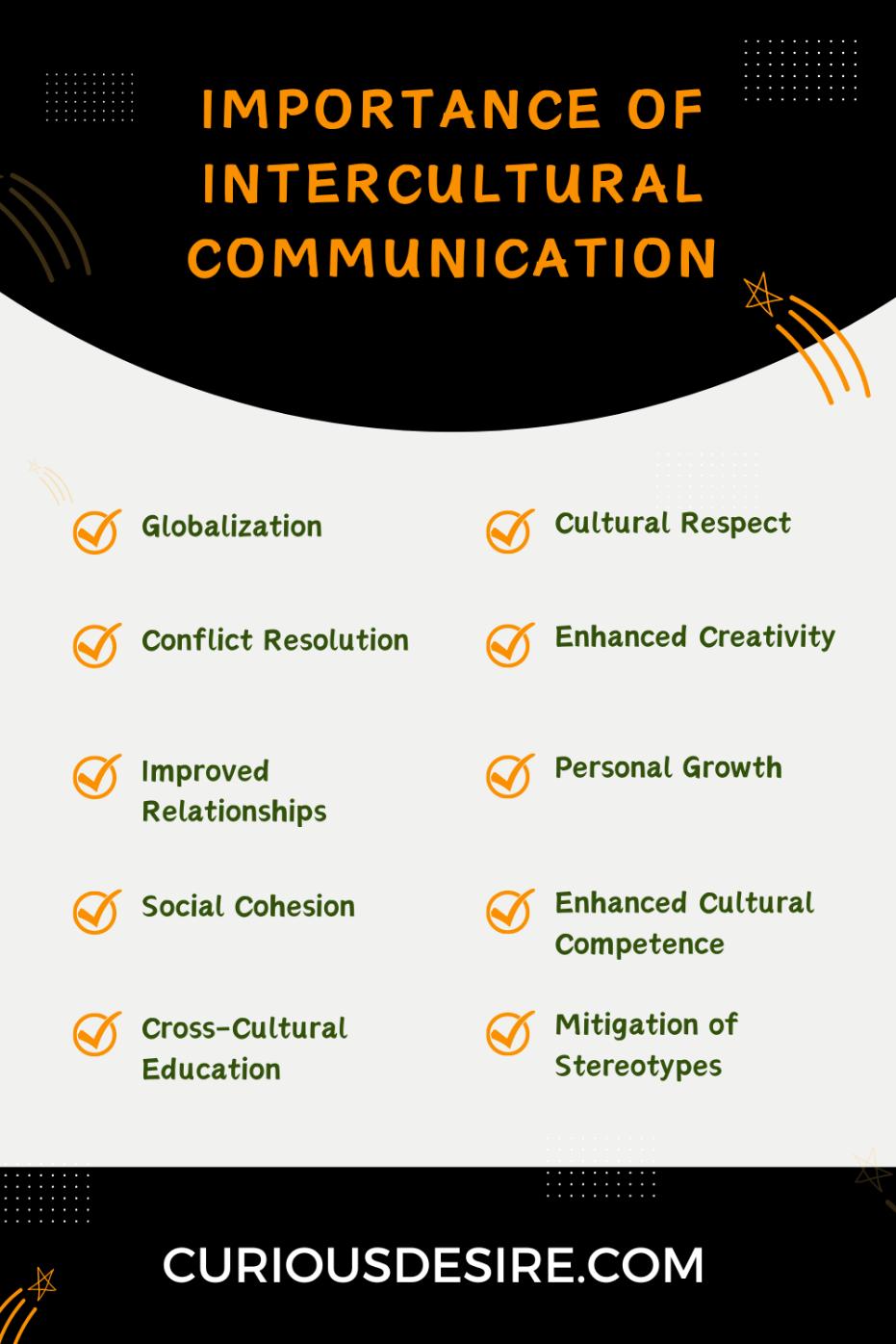[toc]

1. Globalization
In today’s interconnected world, globalization has made it commonplace for businesses, organizations, and individuals to engage with people from diverse cultural backgrounds regularly.
Effective intercultural communication plays a crucial role in facilitating smooth interactions and collaborations across borders.
This is essential for businesses seeking to expand internationally and individuals aiming to engage with a broader range of perspectives.
2. Cultural Understanding and Respect
Intercultural communication is key to promoting mutual understanding and respect among people from different cultural backgrounds.
By actively learning about each other’s customs, values, beliefs, and communication styles, individuals can avoid misunderstandings and conflicts.
This promotes harmony and cooperation in multicultural environments, ultimately leading to more inclusive and respectful interactions.
3. Conflict Resolution
Misunderstandings stemming from cultural differences often lead to conflicts in personal and professional settings.
Intercultural communication skills are vital for identifying and resolving these conflicts effectively.
By promoting empathy, tolerance, and compromise, individuals can understand the root causes of conflicts through a cultural lens.
This enables them to find mutually acceptable solutions, promoting a healthier and more productive relationship.
4. Enhanced Creativity and Innovation
Diversity in perspectives is a catalyst for creativity and innovation.
Intercultural communication brings together individuals with unique insights and experiences, creating a dynamic exchange of ideas.
By embracing diverse viewpoints, organizations can develop more innovative solutions to complex problems, staying competitive in a rapidly changing world.
This synergy of ideas leads to breakthrough innovations and advancements.
5. Improved Relationships
Building strong interpersonal relationships is essential for success in both personal and professional life.
Intercultural communication skills enable individuals to establish meaningful connections with people from different cultural backgrounds.
By providing trust and rapport through effective communication, regardless of cultural differences, individuals can enjoy richer personal experiences and cultivate more productive professional relationships.
6. Personal Growth and Development
Engaging in intercultural communication presents opportunities for personal growth and development.
It challenges individuals to step outside their comfort zones, expand their worldview, and develop empathy and cultural sensitivity.
This promotes self-reflection, adaptability, and open-mindedness, leading to a deeper understanding of the world and one’s place within it.
Interacting with people from diverse backgrounds enriches experiences and fosters continuous learning and growth.
7. Social Cohesion and Harmony
In multicultural societies, effective intercultural communication is essential for promoting social cohesion and harmony.
By providing cross-cultural understanding and empathy, it bridges divides and builds stronger, more inclusive communities.
Intercultural communication advocates for social justice, equity, and inclusion by recognizing the rights and dignity of all individuals, irrespective of their cultural background.
This gives a sense of belonging and unity within diverse societies.
8. Enhanced Cultural Competence
Intercultural communication promotes cultural competence, which is the ability to effectively interact with people from diverse cultural backgrounds.
Developing cultural competence enables individuals to navigate cultural differences with sensitivity and confidence, enhancing their adaptability and success in multicultural environments.
9. Facilitation of Cross-Cultural Learning and Education
Intercultural communication serves as a gateway to cross-cultural learning and education.
It facilitates the exchange of knowledge, ideas, and experiences between different cultures, enriching educational experiences and promoting global citizenship.
Through intercultural communication, individuals gain insights into different worldviews and cultural practices, fostering lifelong learning and cultural appreciation.
10. Mitigation of Stereotypes and Prejudices
Intercultural communication challenges stereotypes and prejudices by promoting direct interactions and understanding between individuals from different cultural backgrounds.
Breaking down barriers and expressing empathy, helps combat biases and misconceptions, leading to more inclusive and tolerant societies.
Through meaningful dialogue and exchange, intercultural communication encourages individuals to see beyond stereotypes and recognize the diversity and complexity of human experiences.
Importance of Intercultural Communication FAQs
1. What is the most important component of intercultural communication?
The most important component of intercultural communication is empathy.
Empathy involves the ability to understand and share the feelings, thoughts, and perspectives of others, especially those from different cultural backgrounds.
Without empathy, effective communication across cultures becomes challenging as it requires the capacity to recognize and respect diverse viewpoints, experiences, and values.
2. What is the importance of intercultural understanding?
Intercultural understanding is crucial for promoting harmony, cooperation, and respect in diverse environments.
It allows individuals to navigate cultural differences with sensitivity and openness, fostering meaningful connections and relationships across borders.
Through intercultural understanding, people can bridge divides, break down stereotypes, and build inclusive communities based on mutual respect and appreciation for cultural diversity.
3. What is the importance of international communication?
International communication is essential for facilitating global cooperation, economic exchange, and cultural understanding.
It enables businesses to expand into new markets, governments to negotiate treaties and agreements, and individuals to engage with diverse perspectives and experiences from around the world.
Effective international communication fosters collaboration and innovation on a global scale, driving progress and development across various fields.
4. What are the six main reasons why it is necessary to study intercultural communication?
- Globalization: In an interconnected world, intercultural communication skills are essential for navigating diverse cultural landscapes.
- Cultural Understanding: Studying intercultural communication promotes empathy, respect, and appreciation for cultural diversity.
- Conflict Resolution: It provides tools and strategies for addressing conflicts arising from cultural differences.
- Business and Career Advancement: Intercultural communication skills are increasingly valued in the global marketplace.
- Personal Growth: Engaging in intercultural communication challenges individuals to expand their worldview and develop cultural sensitivity.
- Social Cohesion: Effective intercultural communication fosters inclusive and harmonious communities by bridging cultural divides and promoting understanding.
5. What is the importance of intercultural communication 5 points?
- Facilitates Global Interactions: Intercultural communication enables smooth interaction and collaboration across borders in an increasingly interconnected world.
- Promotes Respect and Understanding: It fosters mutual respect and appreciation for diverse cultural perspectives, leading to harmony and cooperation.
- Enhances Conflict Resolution: Intercultural communication skills are essential for identifying and addressing conflicts stemming from cultural differences effectively.
- Drives Innovation: Diversity in perspectives stimulates creativity and innovation, making intercultural communication vital for problem-solving and decision-making.
- Builds Stronger Relationships: Cultivating intercultural communication skills enables individuals to establish meaningful connections and build trust in multicultural environments.
6. What are the four reasons for studying intercultural communication?
- Cultural Sensitivity: To develop an understanding and appreciation for diverse cultural perspectives.
- Effective Communication: To learn how to navigate communication barriers and misunderstandings in multicultural settings.
- Conflict Resolution: To acquire skills for resolving conflicts arising from cultural differences.
- Global Citizenship: To become a responsible and engaged member of an increasingly interconnected world.
7. What are the six dimensions of intercultural communication?
- Verbal Communication: Differences in language and speech patterns.
- Nonverbal Communication: Variances in body language, gestures, and facial expressions.
- Cultural Values: Varied beliefs, customs, and societal norms.
- Social Organization: Differences in family structure, social hierarchy, and community dynamics.
- Context: Variances in cultural contexts and situational cues influencing communication.
- Perception and Thinking: Diverse ways of interpreting and processing information based on cultural backgrounds.
8. What are the six steps to effective intercultural communication?
- Cultural Awareness: Acknowledge and recognize one’s cultural biases, assumptions, and stereotypes.
- Empathy: Strive to understand and empathize with the perspectives and experiences of individuals from different cultures.
- Adaptability: Be flexible and adaptable in communication styles and behaviors to accommodate cultural differences.
- Respect: Show respect for cultural norms, values, and customs, even if they differ from one’s own.
- Open-mindedness: Approach intercultural interactions with an open mind and willingness to learn from others.
- Continuous Learning: Commit to ongoing learning and improvement in intercultural communication skills to navigate diverse cultural environments effectively.

